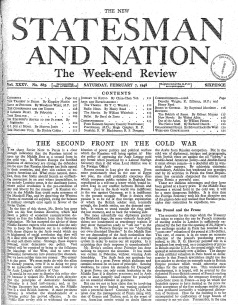|
Monteverdi (Reprise)I was neglectful and lazy in my last post, for not providing a more authoritative and interactive link to Monteverdi's Vespers (index of .mp3s). Shame on me!
Monteverdi's Vespers I turned up an interesting exchange in plumbing the depths of The New Statesman and Nation. Alongside Reed's Radio Notes column for February 7th, 1948, in which he assesses Living Writers — a collection of critical talks given on the BBC's Third Programme — was a small, one-paragraph letter to the editor from Reed himself, entitled "Monteverdi's Vespers" (.pdf). In this letter, Reed is responding (apologizing, really) to a Mr. Redlich, who apparently had a strong reaction to the Radio Notes column of January 24th, two weeks earlier. Reed had reviewed the Third Programme's first three installments of A History in Sound of European Music, and lamented the "vocal inadequacy so often revealed by the Third's resuscitations of ancient music." Reed felt, for example, that the recent broadcast of Claudio Monteverdi's Vespers had left him feeling "embittered and frustrated." I do not, unfortunately, have a copy of the letter from Mr. Redlich, but I can easily surmise it appears in the January 31st, 1948 issue of The New Statesman. I can also deduce that Mr. Redlich probably knew well of what he spoke, if he is, in fact, the H.F. Redlich, who wrote a great deal on Monteverdi. His opinion would have mattered a great deal to Reed, an unrepentant music snob, which would go far toward explaining his apologetic (if somewhat defensive) tone: But I hope Mr. Redlich does not really think that I should like to hear a choral work sung throughout in a steady fortissimo. I think I have said nothing to imply that. But I also know that Italian singing can be at times excrutiatingly vulgar. Incidentally, Reed's reply also mentions his having attended a recent music festival in Perugia, Italy, where he heard the Rome Opera Chorus peform some of Monteverdi's Psalms. The facts of which, I think, are some small justification for this monomaniacal attempt to track down everything written by our particular author. The briefest, 150-word editorial reveals part of Reed's itinerary from his fourth trip to Italy, in 1947.
Decrier, RepliedWonderful! Peter Stothard at the Times responds to my post from last week, by reproducing the full text of his 1998 Ted Hughes commemorative, "The Poet Laureate's Last Reading."
Mr. Stothard recommends Wagner's Ariel's Gift for a "sensitive and balanced" explication of Hughes' Birthday Letters to Plath, which is, I think, exactly what I was asking for, falling just shy of some way to posthumously debate the merits of Reed's poetry with Mr. Hughes.
Ted Hughes Wrecks His CarBack when Ted Hughes' Birthday Letters came out, there was a lot of renewed tumult over his troubled marriage to Sylvia Plath, and how he had handled (or mishandled) her legacy. I remember not knowing much about Hughes, nor being familiar with his poetry, and I went right out and picked up a copy of his collection, Crow, as a means of introduction.
A young poet friend of mine soon caught me reading Hughes, and she nearly plotzed: How can you be reading that bear, that monster, that beast? Don't you know he killed Sylvia Plath? I felt ashamed. Ignorant, and ashamed for not possessing the same, boldly personal conviction. But at least I was willing to give Hughes a chance to tell his side of the story. When I was sufficiently caught up through Crow, I turned to the library's copy of Birthday Letters, which to my surprise, I found both haunting and moving. Today, however, for all my purported open-mindedness, I came across a newspaper article which quickly started shifting my opinion. Explication: Just after Hughes' death, the London Times editor Peter Stothard wrote a recollection of the poet's last public poetry reading, in April of 1997 ("The Poet Laureate's Last Reading," 30 October 1998, 24). Hughes was promoting the School Bag anthology of poetry for students (Magma review), alongside his co-editor, Seamus Heaney. Hughes read a selection from Whitman's "Song of Myself" which captivated the audience, while Heaney chose Wilde's "The Ballad of Reading Gaol." Following the reading, during an awkward photo-op with the two editors and their collection, Stothard reports he found himself holding the text in front of the photographers. In order to "add fake versimilitude of the sort that publicity pictures require," he began to read aloud the first stanza of the first poem he found inside: Reed's "Naming of Parts." Heaney and I mumbled about Reed and about how this particular poem was 'one of the most extraordinary works of the war'. Hughes became agitated. 'I hate this poem,' he said, as though shovelling rocks into the vacuum around us. 'I once crashed my car listening to it.' [....] Hughes, the man of hawks and crows and earth, the man who gave animals ideas with his eyes, hates this poem. Stothard, obviously a stronger man than I, was not to be swayed. He finished reading the entire poem. 'I had always much preferred the public, car-crashing Reed, who looked at the gun and the gardens through the same cold eye and placed them side by side in the same stanza frame.' As for myself, so easily turned, if I should catch you with a copy of Birthday Letters, it might be me hurling accusations next time. How can you be reading that bear, that monster, that beast? Don't you know he hated "Naming of Parts"?
|
||||||||||||||||||||||||||
|
|
|||||||||||||||||||||||||||







